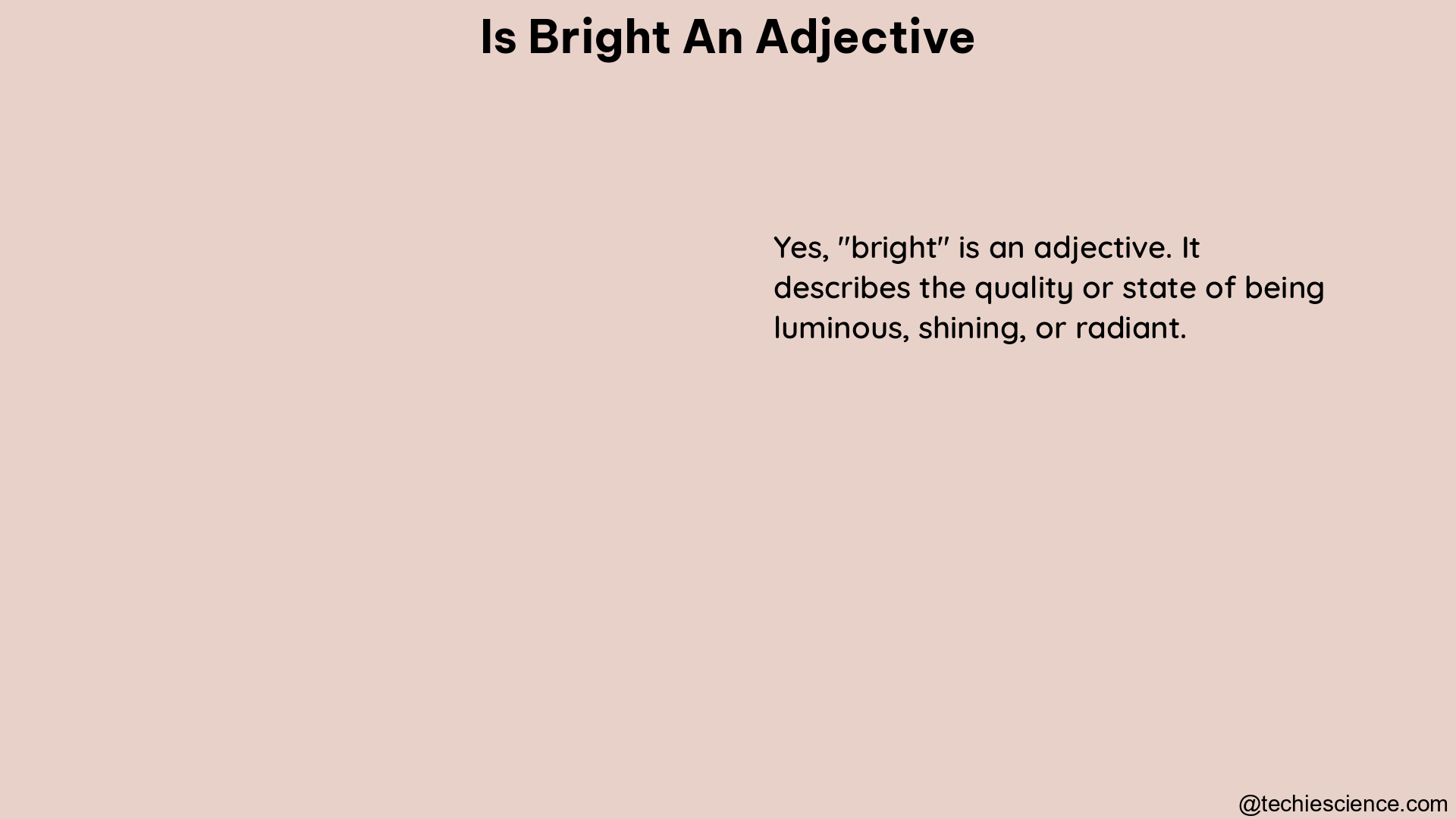Yes, “bright” is an adjective that can be used to describe various qualities such as light, color, mood, and intelligence. This comprehensive guide will delve into the grammatical specifications, examples, and nuances of using “bright” as an adjective in the English language.
Bright as an Adjective Describing Light and Color
One of the primary uses of the adjective “bright” is to describe the intensity or quality of light. When used in this context, “bright” can convey the following meanings:
- Intensity of Light: The room was bright with sunshine. The bright light from the window illuminated the entire space.
- Shine or Sparkle: Her eyes were bright with tears. The diamond ring had a bright, dazzling shine.
- Color Intensity: The bright yellow dress caught everyone’s attention. The bright red apple was ripe and juicy.
In these examples, “bright” is used to modify nouns related to light, such as “sunshine,” “light,” “eyes,” “dress,” and “apple,” to describe their luminous, radiant, or vivid qualities.
Bright as an Adjective Describing Mood and Disposition

The adjective “bright” can also be used to describe a person’s mood, demeanor, or disposition. When used in this context, “bright” often conveys a sense of cheerfulness, liveliness, and positivity. For instance:
- Cheerful Mood: He always walks into work with a bright smile on his face.
- Friendly Demeanor: She gave me a bright and cheerful greeting.
- Lively Disposition: The children were playing in the bright, sunny park.
In these examples, “bright” is used to modify nouns related to a person’s mood, such as “smile,” “greeting,” and the environment, such as “park,” to convey a sense of warmth, enthusiasm, and optimism.
Bright as an Adjective Describing Intelligence
The adjective “bright” can also be used to describe a person’s intelligence or cognitive abilities. When used in this context, “bright” often suggests a high level of intelligence, quick-wittedness, or academic potential. For instance:
- Intelligence or Quickness of Mind: He’s probably the brightest student in the class.
- Potential and Ambition: The company is always looking for bright, ambitious college graduates.
In these examples, “bright” is used to modify nouns related to a person’s intellectual capabilities, such as “student” and “college graduates,” to convey a sense of exceptional intelligence, academic prowess, or promising potential.
Grammatical Specifications of “Bright” as an Adjective
- Parts of Speech: “Bright” is primarily an adjective, but it can also function as an adverb in certain contexts, such as when modifying another adjective (e.g., “bright red”).
- Synonyms: Some synonyms for “bright” include “radiant,” “dazzling,” “gleaming,” “cheerful,” “intelligent,” and “promising,” depending on the context in which it is used.
- Antonyms: Antonyms of “bright” include “dim,” “dull,” “dark,” “gloomy,” and “unpromising,” again depending on the context.
Conclusion
In summary, “bright” is a versatile adjective that can be used to describe a wide range of qualities, including light, color, mood, and intelligence. By understanding the various ways in which “bright” can be employed as an adjective, you can enhance your command of the English language and use this word effectively in your written and spoken communication.
References:
- Merriam-Webster. (n.d.). Bright. Retrieved from https://www.merriam-webster.com/thesaurus/bright
- Oxford Learners Dictionaries. (n.d.). Bright. Retrieved from https://www.oxfordlearnersdictionaries.com/us/definition/american_english/bright_1
- Merriam-Webster. (n.d.). Bright Definition & Meaning. Retrieved from https://www.merriam-webster.com/dictionary/bright
- English Language & Usage Stack Exchange. (2016, March 22). “Bright” Part of speech. Retrieved from https://english.stackexchange.com/questions/315215/bright-part-of-speech
- Dictionary.com. (n.d.). Bright. Retrieved from https://www.dictionary.com/browse/bright

Hi…. I am Goutam Datta. I have completed a double M. A. in English and B. Ed. I am a creative writer. Currently, I am a part of the LambdaGeeks.